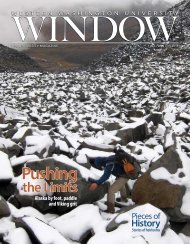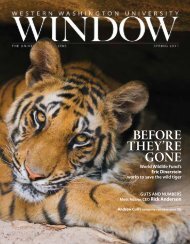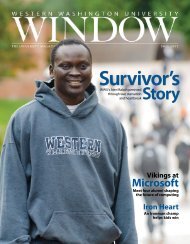WINDOW
Bruce Shepard Eyes Western's Future - WINDOW - The magazine ...
Bruce Shepard Eyes Western's Future - WINDOW - The magazine ...
You also want an ePaper? Increase the reach of your titles
YUMPU automatically turns print PDFs into web optimized ePapers that Google loves.
14<br />
Continued from Page 15<br />
they’re going to have the energy to endure their seven minutes<br />
of pain on race days.<br />
So the team channeled their love of food into weekly potluck<br />
gatherings. They swapped recipes and ideas for how to get<br />
the most out of what they put in their bodies. They even wrote<br />
a cookbook for assistant coach<br />
Salmon<br />
Salmon Pesto Soup<br />
Submitted by Maddie ECKMANN<br />
2 tablespoons butter or margarine<br />
1 tablespoon olive oil<br />
1 cup leeks, chopped<br />
½ cup red bell pepper<br />
½ cup yellow bell pepper<br />
5 cups chicken stock<br />
1 cup clam juice<br />
½ cup orzo pasta<br />
1 pound salmon fillet<br />
1/3 cup fresh basil, slivered<br />
½ teaspoon salt<br />
½ teaspoon black pepper<br />
3 tablespoons pesto<br />
2 tablespoons Parmesan cheese,<br />
grated<br />
Heat butter and oil in a large<br />
pot over medium heat. Sauté leeks<br />
and peppers until tender, about<br />
4 minutes. Add chicken stock<br />
and clam juice, bring to a simmer<br />
and add orzo. Cook until orzo<br />
is tender, about 7 minutes. Skin<br />
salmon and remove bones. Cut<br />
into ½-inch pieces. Add salmon<br />
and basil to pot and simmer until<br />
salmon is cooked through, about<br />
5 minutes. Season with salt and<br />
pepper. Stir in pesto. Ladle soup<br />
into bowls and sprinkle with<br />
Parmesan. Serve hot.<br />
Karla Landis (’03), who<br />
passed along some team<br />
favorites found here.<br />
They also fixed their<br />
own meals before races,<br />
staying in hotel rooms<br />
with kitchens and pooling<br />
their dinner money.<br />
That way no one had to<br />
worry that the dinner<br />
prepared by a stranger<br />
would sit badly in her<br />
stomach during the race<br />
the next day.<br />
“We had one vegetarian<br />
on the team,”<br />
Reynolds says. “We all<br />
made sure she was taken<br />
care of.”<br />
The lifestyle of competitive<br />
rowing drew<br />
their friendships even<br />
closer.<br />
Whitcomb jokes that<br />
she was dating “Bob” all<br />
four years.<br />
“We have a boat<br />
named Bob,” she says.<br />
(It’s named after Bellingham businessman Bob Diehl, a longtime<br />
supporter and one of the university’s first rowing coaches.)<br />
But Whitcomb’s not complaining.<br />
“As corny as it sounds, for me it was all about the girls I was<br />
around and the friendships I was making,” she says. “As much<br />
as I love the sport, for me it was really about the bonds I was<br />
forming with the other people.”<br />
In addition to their grueling rowing regimen, the women<br />
also managed challenging academic schedules. Reynolds, for<br />
example, tried to do her homework ahead of time to complete<br />
her major in Biology/Anthropology and her minor in Chemistry.<br />
Whitcomb relied on summer internships to complete her<br />
major in Toxicology.<br />
“Everyone learned how one another functions when we’re<br />
completely strung out,” Gilbert says. They know each other well<br />
enough to know when to crack a joke and when to keep quiet<br />
during a brutal morning practice when cold rain is turning to<br />
snow, and well enough to know that calling out one rower’s<br />
name motivates her to pull harder, but would only rattle another.<br />
That’s critical knowledge<br />
for the coxswain, responsible<br />
for coming up with<br />
the words to inspire four or<br />
eight exhausted women to<br />
pull even harder.<br />
“We all know that<br />
whatever is going on in<br />
our lives, whatever bad<br />
test scores, relationship<br />
drama, financial problems,<br />
anything like that, when<br />
you get in the boat, you’re<br />
in the boat,” Gilbert says.<br />
“You leave everything on We did it: Team captain Metta<br />
shore. You’re just there to Gilbert, above right, hugs<br />
row and you don’t want to coxswain Kristy Theodorson<br />
let anyone down.”<br />
after the championship.<br />
It’s not a lifestyle everyone can stick with.<br />
“If you want the kind of freshman college life where you’re<br />
staying up really late, meeting people and going to parties,”<br />
Gilbert says, “rowing’s not for you.”<br />
Even with the winning record, about half to two-thirds<br />
of the team leaves each year. Fuchs understands why so many<br />
decide to leave, but it’s part of his philosophy that being on the<br />
team is a choice. That’s why he only recruits freshmen from<br />
among students who already have been admitted to Western.<br />
“They’re on the team first because they wanted to come to<br />
Western,” he says.<br />
Even workout instructions sometimes sound like suggestions,<br />
says Reynolds.<br />
“He’s not checking to make sure we do it,” Reynolds says.<br />
“But when it comes time to<br />
Granola<br />
Granola<br />
Submitted by Staci Reynolds<br />
6 cups oats<br />
½ cup sunflower seeds<br />
½ cup sliced almonds<br />
½ cup flaxseed meal<br />
¼ cup sesame seeds<br />
1 tablespoon cinnamon<br />
1 teaspoon salt<br />
½ cup honey, warmed with 2<br />
tablespoons canola oil<br />
½ cup brown sugar<br />
Combine all dry ingredients. Mix<br />
in warmed honey and oil. Bake<br />
at 250 degrees for 30 minutes,<br />
stirring every 10 minutes. Turn<br />
off oven and let dry until cool.<br />
Store in sealed plastic bag.<br />
choose the boat, he’s going<br />
to choose people who<br />
are the most fit, who have<br />
obviously been doing all<br />
the workouts. He knows<br />
he can trust them. They’re<br />
not going to stop working<br />
hard, because they’ve<br />
been given a choice and<br />
they’ve chosen the harder<br />
path.”<br />
It’s hard to imagine<br />
life without crew, says<br />
Reynolds, who spent part<br />
of her summer training<br />
for singles rowing events.<br />
“It’s amazing to<br />
accomplish a race in a<br />
single,” she says, “because it’s so intense – and so painful.”<br />
But a boat with one woman, she says, doesn’t have nearly the<br />
momentum as a boat pulled by eight friends.<br />
It’s more than just a bike<br />
By John Thompson and Stacee Sledge<br />
A WWU Industrial Design<br />
professor knows a better bicycle<br />
would mean a better life for<br />
Uganda’s ‘boda-bodas,’ who<br />
carry the country’s people and<br />
cargo on two wheels.<br />
When Jason Morris, assistant professor of<br />
Industrial Design, saw photos of the rickety<br />
bicycles pedicab operators in the Ugandan<br />
town of Hoima used to shuttle clients and<br />
cargo, he knew he could do better.<br />
“My first thought was, how old are these<br />
bikes?” says Morris, a cyclist himself. The design<br />
looked like it was from World War I — and he<br />
later learned it was.<br />
“It’s like riding around on Model T’s in the<br />
year 2008,” Morris says.<br />
The bikes, ridden by “boda-bodas,” are<br />
a primary source of transportation for most<br />
Ugandans. Cars and gas are so expensive<br />
that automobile ownership is prohibitive.<br />
So people and cargo are ferried around on<br />
bicycles.<br />
“It’s a profession<br />
for many<br />
young, p o or<br />
Ugandan men,”<br />
Morris says.<br />
The problem<br />
is that they<br />
u s e a n c i e n t<br />
b i kes. “ Even<br />
t h e n e w e r<br />
bikes imported<br />
from India are<br />
of the design<br />
c o m m o n t o<br />
touring bikes in<br />
Europe 75 years<br />
Jason Morris in Uganda.<br />
ago,” says Morris.<br />
“They’re not built to carry cargo.”<br />
Two years ago, Morris’s mother — an Anglican<br />
minister doing mission work in Uganda<br />
— formed a design team made up of five local<br />
boda-bodas, who gathered regularly for lunch<br />
and discussed the ideas Morris had for a new<br />
Courtesy photos<br />
Two boda-bodas test drive Jason Morris’s new bike design. See more photos<br />
about the project at onlinefast.org/v4 and search for “Jason Morris.”<br />
bike design: sturdier, simple to maintain, and<br />
rugged enough to carry cargo. Slowly, the<br />
team refined Morris’s initial design.<br />
In the spring of 2007, Morris used research<br />
funding to get the prototype built by a Seattle<br />
frame builder, and that summer he took it to<br />
Uganda, courtesy of a summer research grant<br />
and funding available through WWU’s College<br />
of Sciences and Technology.<br />
The reaction to the prototype was even<br />
more effusive than Morris had hoped.<br />
“The guys were so excited,” he says. “They<br />
had been telling everyone who would listen<br />
that they were helping design a new bike<br />
that was going to come from the States, and<br />
nobody believed them. Then one day, there<br />
they were, riding it around town and waving<br />
to everyone. It was just awesome.”<br />
Morris’s prototype utilizes a fairly standard<br />
front end with a customized, reinforced<br />
rear end for carrying cargo, complete with a<br />
smaller rear tire and rim commonly used on<br />
BMX bikes.<br />
Morris stayed in Uganda for three weeks,<br />
helping lead clinics on bike repair, filming a<br />
bicycle-safety video, and meeting with faculty<br />
at Kampala’s Kyambogo University, who<br />
hope to start the country’s first program in<br />
industrial design.<br />
To thank the Ugandans for consulting on<br />
the bike’s design, Morris gave each design<br />
team member a toolbox full of bicycle tools<br />
and tools for their machines.<br />
“They could use those tools to help other<br />
people in their community work on their bikes,<br />
fix flats and oil chains,” says Morris. “They<br />
owned no tools and were so excited about the<br />
gifts that they immediately sent someone to<br />
the radio station and brought back a reporter<br />
to spread the news.”<br />
Morris’s goal is to get these bikes manufactured<br />
and to the boda-bodas at the same price<br />
for which they are buying their inefficient,<br />
outdated bikes now.<br />
He continues to publicize the project and<br />
is working on a short documentary about it.<br />
He also recently presented the project at a<br />
national conference of the Industrial Designers<br />
Society of America.<br />
“It could be an incredible micro-enterprise<br />
for some company,” Morris says. The application<br />
for the design patent has been sent.<br />
“We’ll see where this next step takes us,”<br />
he says.<br />
15








